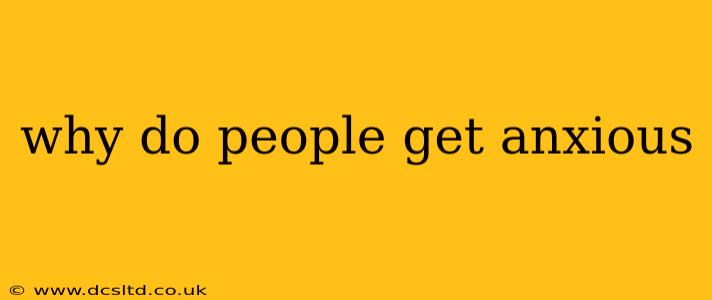Why Do People Get Anxious? Unraveling the Complexities of Anxiety
Anxiety. That familiar knot in your stomach, the racing heart, the feeling of impending doom. It's an experience shared by millions, but the reasons behind it are surprisingly complex and multifaceted. Understanding why people get anxious requires delving into a combination of biological, psychological, and environmental factors. This isn't a simple "one size fits all" answer, but rather a tapestry woven from various threads.
What are the biological factors that contribute to anxiety?
Our brains are intricately wired, and imbalances in neurotransmitters like serotonin, GABA, and norepinephrine can significantly impact our anxiety levels. Genetic predisposition also plays a crucial role. Family history of anxiety disorders increases your likelihood of experiencing them yourself. Furthermore, certain medical conditions, such as thyroid problems or heart conditions, can manifest as anxiety symptoms. It's vital to rule out any underlying medical issues before solely focusing on psychological factors.
How does psychology influence anxiety?
Psychological factors are key players in anxiety development. Past traumatic experiences, stressful life events (job loss, relationship problems, financial difficulties), and ongoing stressors can trigger or exacerbate anxiety. Learned behaviors, where anxiety becomes a conditioned response to specific situations or stimuli, also contribute significantly. Negative thought patterns and cognitive distortions, such as catastrophizing or overgeneralization, fuel the anxiety cycle. Essentially, how we perceive and interpret events heavily influences our emotional response.
What role does the environment play in anxiety?
Our surroundings significantly impact our mental well-being. Chronic exposure to stress, either at home or in the workplace, can deplete our coping mechanisms, making us more vulnerable to anxiety. Social factors, such as bullying, discrimination, or social isolation, can also trigger or worsen anxiety symptoms. Even seemingly minor environmental stressors, when accumulated, can have a cumulative effect on our mental health.
What are some common triggers for anxiety?
Triggers vary widely from person to person. However, some frequent triggers include:
- Social situations: Public speaking, meeting new people, or attending social gatherings can be particularly anxiety-provoking for some.
- Specific objects or situations: Phobias, such as fear of heights (acrophobia) or spiders (arachnophobia), are specific anxiety disorders triggered by particular stimuli.
- Financial worries: Concerns about money, debt, or job security are common sources of stress and anxiety.
- Health concerns: Anxiety can be significantly heightened by worries about one's own health or the health of loved ones.
- Relationship problems: Conflict, uncertainty, or loss in relationships can be significant anxiety triggers.
Can anxiety be inherited?
Yes, there's a strong genetic component to anxiety. Studies have shown that individuals with a family history of anxiety disorders are at a higher risk of developing them themselves. However, it's important to remember that genetics don't dictate destiny. While predisposition increases the likelihood, it's not an absolute guarantee. Environmental factors and personal coping mechanisms play a significant role in shaping an individual's experience with anxiety.
What are some effective ways to manage anxiety?
Fortunately, various effective strategies exist to manage and mitigate anxiety. These include:
- Therapy: Cognitive Behavioral Therapy (CBT) and other therapeutic approaches help individuals identify and challenge negative thought patterns and develop coping mechanisms.
- Medication: In some cases, medication can be beneficial in managing severe anxiety symptoms. This should always be done under the guidance of a medical professional.
- Lifestyle changes: Regular exercise, a healthy diet, sufficient sleep, and mindfulness practices can all contribute to improved mental well-being.
- Stress management techniques: Techniques like deep breathing exercises, yoga, and meditation can help regulate the body's stress response.
Understanding the multifaceted nature of anxiety is crucial for effective management and support. If you're struggling with anxiety, seeking professional help is a significant step towards regaining control and improving your overall well-being. Remember, you're not alone, and help is available.
